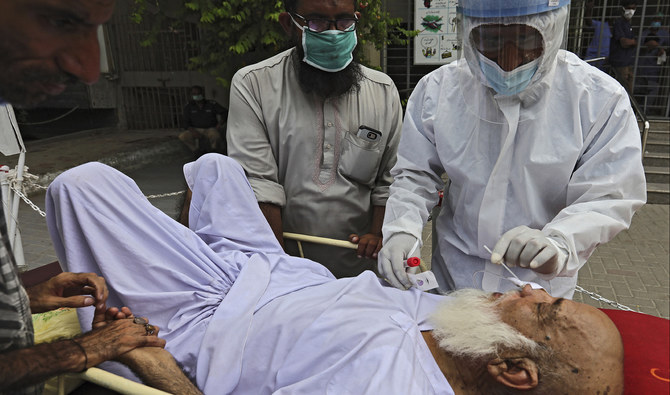ISLAMABAD: The coronavirus pandemic has amplified the critical need to speed up efforts for universal health care in Pakistan, shows a study published by Islamabad-based public policy think tank Tabadlab on Thursday.
Authored by entrepreneurial health care executive Dr. Muhammad Ali Chaudhry and public policy adviser Ammara Khan, the study points out that despite the introduction of programs and initiatives intended to improve the long-neglected state of public health in Pakistan, systemic weaknesses still prevail. The impact of these weaknesses has been perpetuated by the COVID-19 crisis, which reinforces the need to ensure effective crisis management and fast-track progress toward universal health care.
According to the paper, Pakistan ranks 154th out of 195 countries in terms of the quality and accessibility of its health care, which is far behind India (145th), China (48th), Sri Lanka (71st), Bangladesh (133rd) and Bhutan (134th).
The national health infrastructure serving the country’s 220 million population comprises 1,279 hospitals, 5,527 basic health units, 686 rural health centers, 5,671 dispensaries, 747 maternal and child health center and 441 tuberculosis centers. The total availability of beds in these health facilities is estimated at only 145,124.
Pakistan’s health care system is also severely understaffed. The paper shows that there are significantly fewer physicians, nurses, midwives, community health workers, pharmacists than the World Health Organization (WHO) recommends. Doctor to patient ratio in Pakistan 1:1,300, doctor nurse ratio is 1:2.7. The WHO suggests that doctor to patient ratio should be 1:1,000 and doctor nurse ratio 1:4. With such low levels of staffing, Pakistan is listed as one of 57 countries with a critical health workforce deficiency.
The study’s authors argue that with the current fiscal constraints on public health expenditure in Pakistan, it is necessary to explore alternative strategies for enhancing the efficiency of the health system. While the total public spending on health in Pakistan has increased in absolute terms year after year, the allocations as a percentage of GDP seem to be fluctuating significantly. Most recently, it peaked at a high of 1.2 percent in FY 2017-18 before slightly declining to 1.1 percent in 2018-19.
Since the devolution of health to the provinces, the proportion of government health spending has increased in all provinces and is accompanied by higher policy ownership for health. However, the working paper says, allocations are still inadequate to meet the country’s essential health needs and there is lack of strategic harnessing of other government and non-governmental sources of funding.
The paper notes that pressures on public health institutions from a rapidly growing population have allowed the private sector to service the gap created by an ever-increasing demand and limited public health facilities. Currently, there is a preference for private health care across the country, with 70 percent of the population paying out-of-pocket for treatment.
According to the study’s authors, the COVID-19 pandemic and its impact on the wider public health ecosystem, the economy, lives, livelihoods and wellbeing of people and communities across the country only reinforces the need for a “strong and resilient public health system, one that provides affordable high-quality health care and delivers effective crisis management.” Achieving health care universality, the researchers say, will result in improved staffing levels thereby new jobs, ancillary activities that support the sector, increased demand across value chain components and room for innovation and growth.
COVID-19 crisis shows universal health care critically needed in Pakistan — research
https://arab.news/6gm8s
COVID-19 crisis shows universal health care critically needed in Pakistan — research

- Lack of public health facilities results in 70 percent of Pakistanis paying out-of-pocket for treatment
- Pakistan ranks 154th out of 195 countries in terms of the quality and accessibility of its health care, far behind India and Bangladesh
Pakistan, UK discuss regional security, cross-border attacks as senior official visits Islamabad

- British envoy for Afghanistan Richard Lindsay’s visit comes at a time of a surge in militancy in Pakistan’s border regions
- Pakistani diplomat says both sides reviewed broader security challenges, emphasized coordination to address ‘shared concerns’
ISLAMABAD: Pakistani and British officials have discussed regional security challenges and cross-border attacks during talks in Islamabad, a Pakistani diplomat said on Tuesday, during a visit of the United Kingdom’s Afghanistan envoy, Richard Lindsay, to the Pakistani capital.
Pakistan and the UK regularly cooperate on counterterrorism and security, with a focus on intelligence-sharing to combat militant activity. Lindsay’s visit comes at a time of a rise in militancy in Pakistan’s western provinces, which border Afghanistan.
Mohammad Sadiq, Pakistan’s special representative for Afghanistan, said the discussions in Islamabad focused on the regional security situation, particularly the urgent challenge posed by cross-border attacks.
“We also exchanged views on the latest regional security developments and broader security challenges,” he said on X. “We emphasized the importance of continued cooperation and coordination to address shared concerns and promote regional stability.”
Islamabad frequently accuses Afghanistan of allowing its soil and India of backing militant groups, such as the Tehreek-e-Taliban Pakistan (TTP) and the Balochistan Liberation Army (BLA), for attacks against Pakistan. Kabul and New Delhi deny this.
In recent years, Pakistan and the UK have engaged with each other on counterterrorism and cross-border crimes as part of bilateral cooperation.
Both sides held the second round of the Pakistan-UK Counter Terrorism Dialogue in London in February last year, reviewing global and regional threats and exchanging best practices. Over the years, armed forces of both countries have also maintained close cooperation, particularly in counterterrorism efforts and professional military training.









